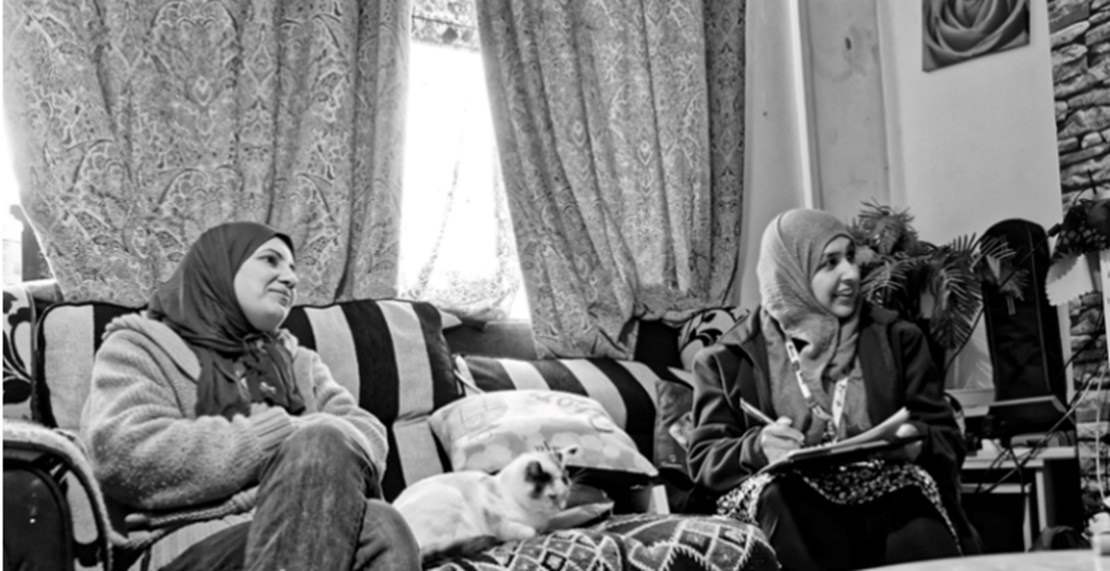‘Building Inclusive Digital Health Innovation Ecosystems’ is a research programme led by the University of Birmingham’s Business School and supported by Arden & GEM’s digital transformation team, together with Walsall Housing Group (whg), to explore ways of involving diverse communities in the co-innovation of digital health technologies.
By adopting a peer approach to research within communities facing health inequalities in Walsall and then exploring the findings within a co-innovation event, health technology developers and decision-makers now have a better understanding of attitudes and barriers to accessing digital healthcare.
The challenge
Greater use of digital technologies has the potential to make healthcare more personalised, preventative and supportive which will ultimately lead to long-term improvements in health outcomes for our population. However, increased digitalisation also has the potential to widen existing health inequalities by creating technological barriers for communities trying to access the healthcare they need.
A deeper understanding of the health needs and access to health technologies of communities, particularly those who are disadvantaged or living in deprived areas, would enable suppliers to develop more effective and responsive healthcare technology solutions. To investigate how innovation of digital healthcare can be more inclusive and responsive to the needs of communities that are often marginalised, the Economic Social Research Council funded research to be led by Birmingham Business School in Walsall.
Our approach
The first step to improving understanding was to gather qualitative data about the way people engage with online technologies.
Using peer researchers
The research team chose to build on the skills, connections and relationships of those living and working in the most economically and socially deprived communities as peer researchers. This enabled conversations to take place in people’s homes and workplaces to collect valuable insights on how people accessed these technologies and the barriers faced.
Whg coordinated the identification of forty ‘community champions’ who were working or volunteering with a wide range of community organisations including:
- ‘Just Straight Talk’ (JST) who specialise in supporting people with multiple challenges
- African Caribbean Community Initiative (ACCI) focusing on mental health support needs of African Caribbean communities.
The community champions were brought together at an event in autumn 2022 to share their existing insight and develop the skills for peer research.
Following 68 interviews, the research concluded that to avoid increasing health inequalities, the digital transformation of health services needs to:
- be based on an in-depth understanding of the specific needs and capabilities of the communities and individuals the technologies and services are designed to serve
- be aligned with the characteristics and needs of communities as well as professionals
- create very local networks of skills development and support
- be accessible to the people who need them.
Conversations with stakeholders considered how best to strengthen these networks to support and enable inclusive innovation. The concept of ‘community co-innovation’ was developed as a way to build space for innovating solutions based on community knowledge. This would involve communities in the innovation process along with innovators and clinicians.
Holding a demonstrator event
Nine months after the community champions/peer researchers were recruited, a community co-innovation event was co-hosted by whg, Birmingham Business School and Arden & GEM.
Participants were invited to meet with community champions to find solutions to problems faced in delivering digital healthcare. A total of 99 people met together at Walsall College, in June 2023, to hear the findings of the research and to put the theory into action.
Participants included:
- community champions and other local community organisations
- innovators of health technology from large firms to start-ups
- clinicians working in the Black Country
- representatives of Black Country ICS.
The community had previously identified specific health concerns around diabetes, mental health and dementia, and maternity care. Additionally, the event’s 19 speakers were also invited to bring a ‘problem’, so that table group discussion could consider solutions. Examples of table group discussions included:
- how to ensure that a mental health app was used by those who most needed it
- how to increase numbers of patients from areas of high deprivation attending diabetes reviews
- how to introduce digital tools to support people living with dementia and their carers.
A team of facilitators and notetakers captured how groups articulated needs and possible solutions. The overall event feedback was overwhelmingly positive.
"Important questions posed today and got to meet some passionate community champions."
Dr Ananta Dave, Chief Medical Officer at NHS Black Country ICB on twitter
The outcomes
Birmingham Business School has presented the research findings and event themes to NHS Black Country ICB, who has since formed a dedicated task and finish group to workstream to exploring how community co-innovation can be applied to issues of concern for their population such as digital GP access.
A playbook has been developed for other organisations to use when creating space for community innovation for delivering digital healthcare.
Key to success is strong community advocates from organisations anchored in their communities. Whg is keen to continue to build a space for community co-innovation in their community.
"It’s given me lots of ideas about how better to engage with communities when designing services and particularly not expecting them to come to us but for us to reach out in ways accessible to them."
Technical firm
More information about the project, including the research findings, is available here: www.biis.org.uk/
